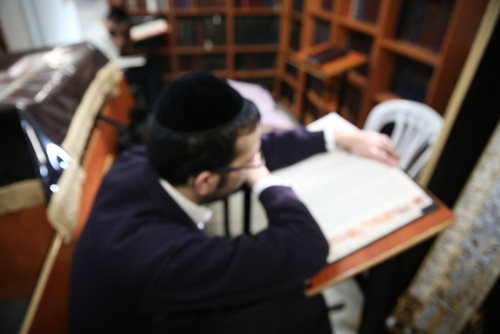< Lesson 15: Friday Night – Translation and Commentary
Lesson 16: Common Mishaps at the Shabbos Table
Introduction to the Shabbos Morning Meal
(Rabbi Rappaport removes the challah cover, makes a scratch on the challah with a knife, then holds up the two loaves of challah and recites the blessing of “hamotzi lechem min ha’aretz”. See lesson 14 for more about challah.)
Welcome to my home. We’re on a Wednesday afternoon, but we’re going to recreate the Shabbos (Shabbat) morning meal.
I would have already recited the kiddush over a cup of wine, just as we begin the Friday night meal with kiddush, fulfilling the positive commandment, “Remember Shabbos to make her holy.” We begin the Shabbos with bringing the holiness of Shabbos into our home, and we also begin the Shabbos morning meal with reciting kiddush over a cup of wine.
However, the kiddush on Shabbos morning is basically really just the brachah (blessing) of “Borei pri hagafen.” There are different customs as to whether we say the paragraph of “Zachor es Yom HaShabbos l’kadsho”, and some people add a paragraph “V’shomru Bnei Yisrael es HaShabbos.” Whatever your custom is, that’s what you should follow.
But the real reason that we say the Kiddush on Shabbos morning, why we begin the meal with the brachah of “Borei pri hagafen”, is to make this meal more special. We elevate the meal; it’s not a regular weekday meal. We begin it with the brachah over the cup of wine to add significance and beauty to the meal.
In lesson 16, I’d like to show some common mishaps that happen at the table on Shabbos, and how to deal with them.
Four Mitzvos of Shabbos
Maimonides, in the last chapter of the laws of Shabbos, tells us that there are four mitzvos (Torah commandments) that we have on Shabbos:
There are two Torah mitzvos:
- Zachor es Yom HaShabbos l’kadsho, remember Shabbos to sanctify it.
- We fulfill this mitzvah with the reciting of the Kiddush.
- Shamor es Yom HaShabbos l’kadsho, guard Shabbos to sanctify it.
- We need to protect Shabbos, to keep it holy. Part of the holiness of Shabbos is that we don’t do those forbidden acts on Shabbos that we do during the week. We sanctify Shabbos by not doing whatever is defined by the Torah as melachah, as things that should be not done on Shabbos.
And two rabbinical mitzvos:
These were added by the rabbis – in this case, specifically by the prophet Yeshayahu (Isaiah), as we mentioned in a previous lesson. Those are:
- Oneg Shabbos, to take delight in Shabbos.
- At the Shabbos meal, we have delicacies. We have a special meal on Friday night with more food than you would eat during the regular weekday meal, so that the Shabbos meal is elevated to be a delight. And we enjoy the Shabbos – not only spiritually, but we also bring the physical enjoyment of Shabbos into our spiritually enjoying and spending the day with Hashem.
- Kavod Shabbos, honoring Shabbos.
- We honor Shabbos before Shabbos. We wash ourselves, we bathe, we shower, we make sure that we’re clean. We treat Shabbos as if there is a queen who’s coming to a king or a queen who’s coming to our house. Shabbos Hamalkah, the Shabbos queen, is coming to our house.
- We therefore keep our house clean and neat. We make sure all the mess is removed before Shabbos.
- The table is set with a nice, clean tablecloth.
- We honor the Shabbos queen with wearing special Shabbos clothing. We’re not wearing Shabbos clothing to impress people in shul (synagogue). We’re not wearing Shabbos clothing for the prayers of Shabbos. We’re wearing Shabbos clothing for the Shabbos Hamalkah, for the Shabbos queen. It’s appropriate to wear your Shabbos clothing the whole day on Shabbos – not just when you’re going to synagogue to pray.
- Kavod Shabbos is one of those things that shows that we appreciate the fact that there is a queen in our home.
Cleaning out Stains and Wringing Cloths on Shabbos
In today’s lesson, I’d like to demonstrate one of the things that one is not supposed to do on Shabbos. It has to do with with cleaning spills and things like that, and how to deal with them.
My Shirt is Stained!
So I’ve already made my hamotzi and had my challah. Now I’m going to take the first course of the meal, my gefilte fish. I’d like to have some chrein (horseradish) with my gefilte fish. I’m going to put the horseradish on the fish. And I like to have my fish together with the challah.
(Begins to eat the challah with fish and horseradish) Oy! Some of it has spilled on my shirt. Now, my Shabbos shirt is stained! My Kavod Shabbos, my honor of Shabbos is compromised! I have a stain over here, and a stain over here.
So now, this is what one should do.
First, whatever is above the weave in the shirt, you’re allowed to take off. That’s not a problem. But I have a nice stain left here. My knee jerk reaction would be to grab for the seltzer and pour it out. Oh, no, no, no, no. Don’t.
Keebus, one of the things that we’re not supposed to do on Shabbos, is to wash a fabric. To put some seltzer, or some water on this thing so that it shouldn’t stand in, would seem to be for the honor of Shabbos, so my clothing should be clean. But you can’t keep the honor of Shabbos by not observing the Torah mitzvah of “V’shomru Bnei Yisroel es haShabbos,” to not do melachah (forbidden acts).
So this does not look good at all. I have a nice stain on my shirt. After the meal, I’m going to change my shirt, but right now, when I have this stain, I should look at this stain as a badge of honor. I can’t really do anything to remove the stain.
There’s some grain over here that that’s above the surface of the shirt – I could take it off. But whatever is beneath the weave of the shirt, I have to leave there. I can’t even put any water on it, because that would be a desecration of Shabbos.
Well, I don’t know, maybe if it’s this stained I would go to change my shirt right now…
Oh, No! The Tablecloth has a Red Stain!
So, I finished my fish. Now I think I’ll take some some wine. (Pours wine and takes a drink, places glass on the table and spills it.) Oh, what is wrong with me? What a klutz!
Now, same thing, for whatever is above the surface of the weave, I could take a napkin and place it down on the tablecloth to absorb it. I can’t squeeze anything out of the stain that’s on the tablecloth. But whatever is above the surface, I could put on my napkin and throw it away.
Of course, I would like to spread some seltzer, or some water over there so that it shouldn’t set. But I have to leave it the way it is.
Avocado Accident
Okay, now I think I’m going to have some avocado dip, some guacamole, together with my challah.
And I bet you can anticipate what’s going to happen. (Takes a bite.) Not bad. Honey, you made good guacamole today! (Takes some more guacamole on the challah and drops some on the tablecloth.)
Oh, I can’t believe it! What am I supposed to do?
Stop and think for a second. I could definitely take up that which is above the surface. But there’s a stain over there. I can’t pour any seltzer or water over the stain. I can’t even take a dry, clean napkin and rub it – that also would be removing the stain, something that I should not do.
Let me take something to drink. My, this is very stressful, this meal. I want to have a nice, serene Shabbos. Remember, all of these stains we are leaving here are just honoring Shabbos by observing Shabbos. L’chaim!
Cholent Fiasco
Okay, let’s have some cholent. And, I’m going to put some cholent on the plate… and (drops some on the table)… What a mess! What a klutz I am!
So we know what I’m going to do. I’m going to take the fork, and lift up what’s on the surface. And even though there’s a stain over there, I’m not going to do anything about it. It’s going to stay the way it is.
Puddle on the Floor
For our final trick of the day, the final mishap… this often happens when the children are at the table. I’m going to pour myself a glass… (splashes water all over the floor)
Oh, I cannot believe it. Can you believe that?! I don’t know. Something is definitely wrong with me. I’m going to drink something. It’s good my wife isn’t here now. Oh, no.
The floor has a nice puddle on it. What is one supposed to do? What would you normally do?
(Points to mop) I don’t usually have the mop in my dining room when I’m eating on my Shabbos. It’s here just for the purpose of saying that the map is muktzah. The mop is something that we’re not supposed to handle on Shabbos. To use the mop to absorb the spill that’s on the floor and then wring it out would be something that I was not allowed to do.
This is what we call in Hebrew, a kli shemilachto la’issur. This is something that’s main function is something that can’t be done on Shabbos. So this is muktzah. We’re not going to touch it.
So what can I do? I have a big puddle on the floor.
What I CANNOT do is:
- Take a rag and soak up the water and wring it out and soak up some more water.
- And I also can’t take something that I really care about, a clean napkin, a cloth napkin that I really want to use and I don’t like when it gets wet, and use that to absorb the water, because there’s a fear that you’re going to wring it out. One’s not allowed to wring out the material that’s absorbed with liquid on Shabbos.
Rather, I CAN:
- Take an old towel that I don’t really care about, just put the towel down on the floor, and that would absorb all of the water. Then I can take the towel and put it in the laundry room and deal with it later.
- Or I can do something else: Although I cannot take just one rag to soak up and wring out the water and keep going back and forth till it’s cleaned up, because you’re not allowed to, under any circumstance, wring out the liquid that’s absorbed in the rag. However, what I could do is take a few rags, which are enough to absorb all of the water, then take those rags without wringing them or doing anything which would cause the water to come out, and put them on the side, put them in the laundry room, and then that would be okay.
To Summarize
When something spills on Shabbos, you’re not allowed to wring out any of the liquid that’s absorbed in the material. You’re not allowed to soak the material in water, in seltzer, in a liquid to help lighten or to help make sure that the stain should not set.
Rather, you should look at these challenges as ways of showing your honor of Shabbos.
The Reward of the Man who Keeps Shabbos Properly
I’d like to just finish with reading one Rambam (Maimonides), just to encourage us and to make sure as that as that we’re sitting at the table and we’re enjoying Shabbos, we make sure that the Shabbos table has the beautiful atmosphere of Shabbos.
Rambam writes, at the end of his laws of Shabbos:
“HaShabbos shekulah k’neged kol mitzvos haTorah (Shabbos is equal in weight to all of the mitzvos of the Torah). L’fikach, mishabeiach hanavi v’omer (The prophet Yeshayahu praises one who keeps Shabbos and says), Ashrei enosh sheya’aseh zos (fortunate is the man who does this), uven adam yachzik bo (and a person who holds on to Shabbos), shomer Shabbos meichalelo (who observes Shabbos rather than desecrate it).”
And the Rambam tells us:
“Kol hashomer es haShabbos k’hilchaso (anyone who observes Shabbos with all of its laws and its details), umechabdah (and honors the Shabbos – feels as if the Shabbos queen is in their home on Shabbos and does everything to show that honor of the Shabbos), um’angah (and takes delight of Shabbos – has special Shabbos food), k’fi kocho (according to his ability), kfar mefurash b’kabalas scharo b’olam hazeh, yeser al schar hatzafun b’olam habah (his reward is mentioned in the prophets in this world, in addition to the reward that’s waiting for him in the World to Come).”
He quotes the verse in Yeshayahu:
“Az tis’anag al Hashem (when you take the light of Hashem), v’hirkavtica al bamasei aretz (and God will lift you up on the heights of the world), v’hachalticha nachlas Yaakov avicha (and I will give you the inheritance of Jacob, your father), ki pi Hashem diber (so says Hashem).”
Yeshayahu 58:14
Yeshayahu tells us that one who takes delight in Shabbos, one who enjoys Shabbos, has the reward waiting for them in this world and the next.
May We All Merit these Blessings!
I hope that these videos, these lessons, have been a source of encouragement to observe both the spirit of the law – to recognize that the Shabbos queen is in our home on Shabbos, so that we should go all out to honor the Shabbos queen and elevate ourselves, and to make sure that we observe all of the details of the laws of Shabbos, the things that seem very difficult to control ourselves from doing. We have a stain on our shirt, a dry stain. Of course, it seems very easy just to take your nail and go beneath the surface and clean it off, but one who wants to observe Shabbos and honor Shabbos would not do that.
We should all merit to observe Shabbos, to enjoy Shabbos, to have the delight of Shabbos and merit all of the blessings that Yeshayahu told us we will receive.
Lesson 17: Dessert and Cleanup – Muktzah, Borer, and More >
Rabbi Pinchus Rappaport is a respected rabbi who received his Rabbinic ordination from Yeshiva of Staten Island, under the tutelage of Rabbi Moshe Feinstein. He currently serves as a rabbi in Brooklyn, NY.
Since halachic opinions vary among the rabbis of different communities, Oorah and Rabbi Rappaport encourage you to direct any questions to, and get halachic guidance from, your local Orthodox rabbi. You may, however, rely on this video and email Rabbi Rappaport with questions in the interim, at askrpr2@gmail.com.
Shared as a zechus l’iluy nishmas Moshe Zeev ben Aryeh Leib


